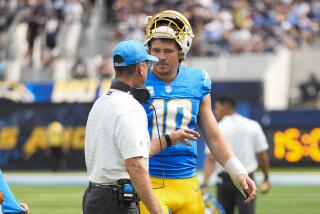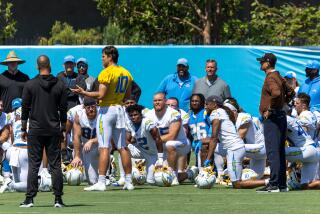Burt’s Bluster Yields to Kinder, Gentler Side : College football: Cal State Northridge’s gruff coach struggles to cope with loss of his daughter.
NORTHRIDGE — Sometimes two and two are four, the stereotype is bold and appropriate, and a book can be told by its cover.
Sometimes not.
Here we have a big, burly fellow who grew up near the docks in San Pedro playing games against the hard-nosed children of fishermen and longshoremen.
He is a football coach. His team, the Cal State Northridge Matadors, is an NCAA Division II squad that labors in the shadows of USC, UCLA and its own dimly lit, rustic and painfully ugly stadium.
He has an in-your-face style with little tolerance for errors--whether they be mental, physical or metaphysical.
The perception is that Bob Burt is a tough guy. Outwardly, he favors that reputation.
This much about Burt is public knowledge: He returns to familiar turf Saturday when Northridge (1-1) plays Cal State Fullerton (0-2) at Santa Ana Stadium. Burt was defensive coordinator for the Titans six seasons before coming to Northridge in 1985. Since then, his teams have won 35 games, more than those under any other football coach in the school’s not-so-fabled history.
Otherwise, Burt has chosen to remain a difficult read. With the blitz on, he does a duck-and-cover. “Some people, when they know too much about you, they can use it against you,” he says.
Some people have mood swings, riding emotional roller coasters.
Burt straddles Colossus.
He has spent more than half of his life coaching at various levels and in a variety of locales. There have been dozens of inspiring victories, but one loss from which he will never fully recover.
In the early morning hours of Saturday, March 28, 1987, Burt’s 21-year-old daughter, Erin, ingested a lethal combination of prescription drugs and alcohol at her apartment in Costa Mesa.
Recollections from past games fade. The memory of an only daughter does not. Emotions that once remained welled deep within burst forth with little coaxing.
“For a pretty tough guy on the surface, Bob comes to tears faster than anyone I know,” says Andrea, his wife of 13 years.
The competitive spirit remains, but it is tinged with melancholy.
“I realize now how fragile life is,” he says. “Not a day goes by that I don’t hurt. I miss my daughter. I can be having a great day and all of a sudden feel like crying. It just never goes completely away.”
Nor does it seem that it must. Even grief, he has learned, should be shared. Burt belongs to an organization called Compassionate Friends, a support group for parents whose children have died.
Not long after Erin’s death, Burt witnessed a car crash in which two teen-agers were hurt and another was killed. Instead of leaving the scene, Burt stayed to console the survivors and learn the identity of the dead boy’s parents. Later, he made contact with them and offered information about Compassionate Friends.
“I have responsibilities outside my job and family now that I participate in, if for no other reason than to validate my daughter,” Burt says. “When you lose a child you adjust the best you can, but you don’t get over it.”
So he mourns as privately as possible and tries to be there for others to lean on. This is the way he steadies himself.
One evening, a youth selling candy knocks on the door of the family’s home in Upland. It is dark and cold outside. The boy is shivering.
Burt retreats into the house in search of his wallet and returns with dollar bills in one hand and a jacket in the other. He buys some candy, then wraps the jacket around the boy’s shoulders. “Stay warm,” he says. “Take care of yourself.”
He watches the boy leave, closes the door, finds a chair and weeps.
A year or so goes by and a Northridge player whose scholarship was revoked accuses Burt of being racist in an appeal filed with the school.
There is an investigation and Burt is cleared. Still, the charge troubles him.
Somewhere, Burt knows, a boy with black skin and a jacket many sizes too big knows better.
It is minutes before 3 on an oven-baked afternoon and Burt is high-tailing it toward the practice field when a man approaches him in a way that has become all too familiar.
“Coach,” the man says, “we have a problem.”
Stopping in his tracks, Burt’s eyes narrow and the color from his face flushes to his ears. “Problem?” he replies, raising an eyebrow. “What’s the problem?”
A street sweeper, he is told, has been abandoned by the school’s maintenance crew somewhere around the five-yard line.
“Whenever somebody says we have a problem, I hold my breath and fear the worst,” he says. “We need to be nice to those maintenance people. They’ve been doing a good job cutting our grass for us.”
That would seem a small favor, but Burt is plainly serious. At Northridge, where coaching responsibilities are quintupled by duties as gardener, surrogate father, academic counselor and financial-aid specialist, nothing is taken for granted.
“The on-field coaching is the easy part,” Burt says. “You can see the rewards there. It’s getting to that first practice or first game that’s the hard part.”
He can’t say he wasn’t warned. Friends told Burt that Northridge had little scholarship money and no football tradition.
“People told me not to take this job, that I was nuts,” he says. “I disagreed.”
There were six Matador football coaches who preceded Burt, one of whom escaped with a winning record. In 1984, Northridge had a record of 4-7 with a defense that was known for approaching opposing runners and receivers as if they were onrushing bulls.
In 1985, Burt’s first team was 8-3 and had three shutouts. “The only people who believed we could do what we did that first season were the coaches and players,” Burt says.
Last season, the Matadors made the Division II playoffs for the first time and shared the Western Football Conference title with Cal Poly San Luis Obispo.
Under Burt, Northridge has five consecutive winning seasons.
Northridge was ranked 15th in a preseason poll of Division II coaches before it opened the 1991 campaign with a 20-13 loss at Eastern Washington. The Matadors defeated Eastern New Mexico, 12-10, Saturday.
So now the NCAA pops up and says that if Northridge would like to retain Division I status in its other sports, the football team also must play a Division I schedule by 1993.
“All we need are more scholarships, more coaches and a facility to be competitive,” Burt says with a laugh. He knows he may well go 0 for 3 with that request.
Truth be told, Burt is uniquely qualified to struggle.
Years ago, during a transition between high school jobs, Burt’s family incurred a large medical expense. The hospital bills were not covered by insurance.
He was thousands of dollars short of being able to pay out of pocket, so Burt approached hospital administrators with an alternative plan. He would work it off.
For three years Burt taught during the day, coached in the afternoon then moonlighted as a nurse’s assistant at night.
Burt and staff approach Northridge’s financial shortfall in similar fashion. They work to make up the difference.
“When things get real bad I just remember that I’ve experienced the worst thing that I will ever experience,” he says. “In a competitive situation I will battle with every fiber I have.
“But when it’s over, it’s over.”
More to Read
Go beyond the scoreboard
Get the latest on L.A.'s teams in the daily Sports Report newsletter.
You may occasionally receive promotional content from the Los Angeles Times.







